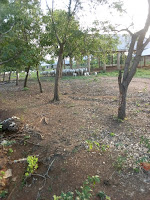1. Population Pressure: Increase in human population has created alternative uses of land for public utilities such as school, road, sewage etc. which makes land expensive to acquire.
2. Land Tenure System: Land ownership in Nigeria does not make land available for large scale production.
Farmers who want to engage in large scale production find it difficult to acquire enough land for that purpose because of land ownership system
3. Soil type: The type of soil in an area determining whether that soil will be available for farming or not, if the said type is loamy or clay it will be suitable for farming but if it is sand it will not be suitable.
4. Topography: The slope of the land also determine availability of land for agriculture as hilly, mountainous and other forms of highlands is not suitable for agriculture as erosion will wash away any crop planted on such land.
5. Climate: The climate of an area determines whether the land is suitable for agriculture or not.

Rainfall is the major determinant of crop distribution as area with heavy rainfall encourage tree crops production while area with low moderate rainfall favours food crop production
6. Cultural practices: Cultural practices such as bush burning, deforestation etc. does not make land suitable for agricultural purpose.
A. Agricultural use of land
1. Arable farming.
2. Livestock production.
3. Games reserve.
4. National park.
5. Forest reserve.

6. Agro-based industry.
7. Construction of dam and fish pond.
8. Farm settlement.
9. Horticulture.
B. Non-agricultural use of land.
1. Farming and quarrying.
2. Construction of residential building.
3. Construction of road and rail.
4. Construction of industries.
5. Construction of schools and hospital.
6. Construction of stadia.
7. Construction of airport and seaport.
2. Land Tenure System: Land ownership in Nigeria does not make land available for large scale production.
Farmers who want to engage in large scale production find it difficult to acquire enough land for that purpose because of land ownership system
3. Soil type: The type of soil in an area determining whether that soil will be available for farming or not, if the said type is loamy or clay it will be suitable for farming but if it is sand it will not be suitable.
4. Topography: The slope of the land also determine availability of land for agriculture as hilly, mountainous and other forms of highlands is not suitable for agriculture as erosion will wash away any crop planted on such land.

5. Climate: The climate of an area determines whether the land is suitable for agriculture or not.

Rainfall is the major determinant of crop distribution as area with heavy rainfall encourage tree crops production while area with low moderate rainfall favours food crop production
6. Cultural practices: Cultural practices such as bush burning, deforestation etc. does not make land suitable for agricultural purpose.
A. Agricultural use of land
1. Arable farming.
2. Livestock production.
3. Games reserve.
4. National park.
5. Forest reserve.

6. Agro-based industry.
7. Construction of dam and fish pond.
8. Farm settlement.
9. Horticulture.
B. Non-agricultural use of land.
1. Farming and quarrying.
2. Construction of residential building.
3. Construction of road and rail.
4. Construction of industries.
5. Construction of schools and hospital.

6. Construction of stadia.
7. Construction of airport and seaport.

